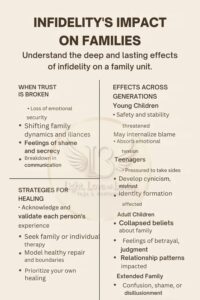Infidelity’s Impact on Families: Understanding the Ripple Effects Across Generations.
Infidelity doesn’t just break the bond between two people—it can unravel the emotional fabric of an entire family.
Whether it involves a couple with young children, adult children, or even aging parents and grandparents, infidelity creates a rupture in the relational system, often sparking confusion, grief, mistrust, and long-term psychological strain.
This post explores how the impact of betrayal echoes through family systems, affecting people in ways they often don’t recognize until the dust settles. We’ll also offer compassionate tools for healing and creating healthy relationship blueprints moving forward.
💔 What Happens to a Family When Trust Is Broken?
Infidelity acts like an emotional earthquake—shaking the foundations of identity, safety, and relational roles. The aftershocks are often felt far beyond the two people directly involved.
Family members may experience:
-
A sudden loss of emotional security
-
Shifting alliances and loyalty conflicts
-
Feelings of shame, embarrassment, or secrecy
-
Disruption of routines, rituals, and holidays
-
A breakdown in communication or trust across generations
Whether it’s a teenager seeing their parent differently, a sibling unsure of how to support one side, or a grandparent quietly grieving the legacy of a marriage—no one escapes untouched.
👨👩👧👦 How Infidelity Impacts Different Generations
1. Young Children
-
Sense of safety and stability is threatened
-
May internalize blame or become emotionally withdrawn
-
Can absorb emotional tension, even when not directly told
2. Teenagers
-
Often feel forced to take sides
-
May develop cynicism around love or mistrust in relationships
-
Their own identity formation can be influenced by what they witness
3. Adult Children
-
Long-held beliefs about family may collapse
-
Feelings of betrayal by the unfaithful parent, or judgment of the betrayed parent
-
May question their own relational decisions and trust patterns
4. Extended Family (Grandparents, In-laws)
-
Experience shame, confusion, or disillusionment
-
May struggle with how to remain neutral or supportive
-
Can inadvertently enable unhealthy dynamics if trying to “keep the peace”
🌊 The Systemic Nature of Betrayal
In family systems theory, a change in one part of the system inevitably affects the whole.
Infidelity introduces:
-
Triangulation: involving a third party shifts emotional responsibility
-
Disruption of hierarchy: children may begin “parenting” emotionally wounded adults
-
Emotional cutoff or enmeshment: family members may withdraw completely or become overly involved
The healing process, then, must be relational, not just individual. Each member of the family needs space to understand, express, and process their own experience—even if they weren’t directly betrayed.
🧘 Tools for Healing the Family System After Infidelity
1. Name What’s Happening
Secrets feed shame. In age-appropriate ways, acknowledge the reality of what occurred without oversharing or projecting.
“Something painful happened between your dad and me, and it’s okay if you’re confused or upset about it.”
2. Let Each Person Have Their Experience
Different members may respond differently—some with grief, others with anger, silence, or avoidance. Avoid forcing forgiveness or perspective.
3. Use Therapy or Facilitated Support
Family therapy, couples therapy, or individual counseling can create safe space for the many voices involved to be heard and held.
4. Rebuild New Relational Blueprints
Show—don’t just tell—children and loved ones what healthy repair, boundaries, and emotional honesty look like.
5. Honor Your Own Healing First
Especially if you’re the betrayed partner, your healing becomes the energetic compass for everyone else. Self-care and nervous system regulation are essential.
✨ Moving Forward: From Fracture to Resilience
Infidelity may forever alter the shape of a family—but it doesn’t have to destroy its soul.
Many families emerge from betrayal more honest, more emotionally intelligent, and more boundaried than before.
But it takes time, intention, and a willingness to face the truth, not just patch the symptoms.
Remember:
-
Healing is non-linear
-
Children grow through what they see modeled
-
Trust can be rebuilt—but only if honesty, accountability, and repair are part of the foundation
You are not broken. Your family is not doomed.
This rupture can become a root of strength, if you allow it to be.
Remember:
Every breath, every action, every moment is an opportunity to walk your spiritual path with grace.
Stay connected, stay committed, and trust that your practice — even amidst the beautiful chaos of life — is leading you exactly where you are meant to be.
Dear Readers,
Thank you for joining me on this journey. I hope you found today’s insights valuable and inspiring.
Check Out This Month’s Happenings!
May your journey be gentle, your spirit be bright, and your world be filled with boundless light, love, and levity.
Namaste.
Meg
@LightLoveLevity





